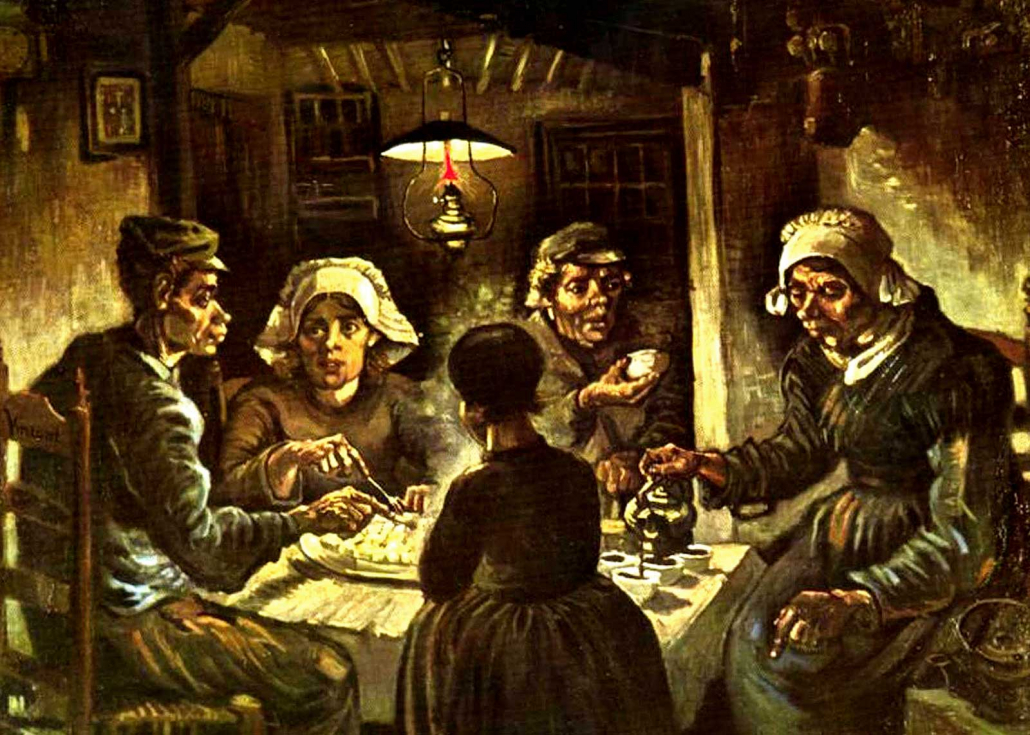Vincent Van Gogh, ‘The potato eaters’, 1885.
‘At one with the teaching’
Andrew Collis
Ordinary Sunday 21, Year B
John 6:56-69
John’s Jesus is a teacher of Wisdom. John’s Jesus is also Wisdom personified, Sophia incarnate. The offence, the “stumbling block”, has to do with this.
It’s one thing to accept the teaching of a teacher. It’s something else to accept/welcome the teacher, which entails another level of understanding, another kind of intimacy. Lives entwined.
Appreciating the generous and costly service/witness of a teacher (brother, sister, elder, co-worker, volunteer). Perhaps hearing the voice of a teacher (mother, father, lover, mentor, friend) within. Or living out a teacher’s philosophy of compassion. Then becoming a teacher, at one with the teaching itself.
When the teacher is vulnerable, persecuted … the intimacy brings risk, therefore resistance. Many of his disciples remark, “We can’t put up with this kind of talk! How can anyone take it seriously?” Jesus says to the Twelve, “Are you going to leave me, too?”
Simon Peter, trembling, answers on our behalf, “Rabbi, where would we go? You have the words of eternal life. We have come to believe; we’re convinced that you are the Holy One of God.”
By the power of the Spirit, our notions of holiness are transformed. The holy comes to signify faithfulness, intimacy, solidarity … abundant life.
In 1885, Dutch artist Vincent Van Gogh painted “The potato eaters”. At the time, it was regarded an offensive work, its peasant family an unworthy artistic subject. Many bourgeois viewers were repulsed by it – felt repelled by its invitation to empathise. In time, as we know, they considered it a masterpiece, a moving depiction of humanity …
Swiss theologian Hans Urs von Balthasar says that recognising this kind of beauty, being drawn toward it (seeing through what at first offends or confounds), means communion with Christ.
By the power of the Spirit, our notions of holiness are transformed. The holy comes to signify faithfulness, intimacy, solidarity … abundant life.
The biblical images of Filipino artist Emmanuel Garibay explode in the mind like parables, turning things upside down, exposing conditions of power and powerlessness. This is the Bible of the poor and marginalised rather than the Bible of comfortable privilege (Rod Pattenden).
One of Garibay’s most widely reproduced works is his exploration of the episode of Emmaus in the gospel of Luke. Here, the early church encounters the risen Christ as the unfamiliar one (the outsider) who has walked alongside us and is finally made recognisable in the sharing of intimacy.
Dorothy’s table setting is inspired by John chapter 6 (Jesus/Sophia giving her body to nourish her children) and by a recently unveiled garden statue of Diana, Princess of Wales, with beloved children (Ian Rank-Broadley).
The statue has offended those who imagine only children of the royal family to be proper/worthy artistic subjects. Whatever our views on the monarchy, the statue, with reference to Diana’s advocacy for children’s rights, says something about holiness.
By the power of the Spirit, our notions of holiness are transformed. The holy comes to signify faithfulness, intimacy, solidarity … abundant life.
Janet Cousens, CEO, Act for Peace, writes: “For the last 30 years, our local partner in Afghanistan has worked with community leaders, parents and teachers to shift attitudes and create opportunities for girls to learn and thrive. Right now, it’s too soon to know what will happen to this important education program.
“But I do know that our brave partner on the ground remains committed to the Afghan people. And that right now, our partner needs our help to support families uprooted from their homes. Thank you for your prayers and compassion during this difficult time.”
As we make our prayers now for the world and for each other, let us pray for our leaders: that Afghan ADF interpreters and their families might be evacuated; that 20,000 Afghans fleeing persecution by the Taliban might be offered asylum; that Afghans already in Australia on temporary visas might be granted permanent visas.
By the power of the Spirit, our notions of holiness are transformed. The holy comes to signify faithfulness, intimacy, solidarity … abundant life.
It’s one thing to accept the teaching of a teacher. It’s something else to accept/welcome the teacher, which entails another level of understanding, another kind of intimacy. Lives entwined. Amen.




